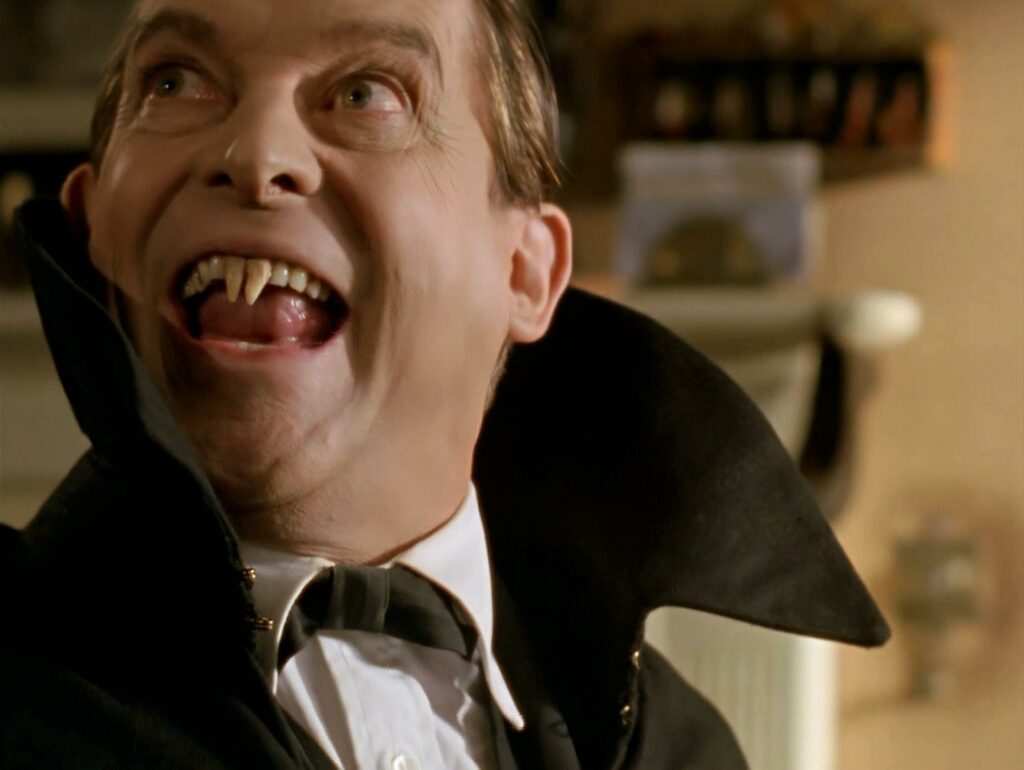
From 1984 to 1994 Jeremy Brett was Sherlock Holmes. To this day no actor has so exactly personified the legendary detective as Brett did. So it’s no wonder that until his death in 1995 Jeremy Brett was as committed to the character he so naturally inhabited as the executives at Granada. As the definitive Sherlock Holmes of the small screen began to experience ever waning health, Granada Television thought it wise to produce a television movie in lieu of an entire season. They had tremendous success after all with the first and second seasons of The Return Of Sherlock Holmes which were each bookended by a feature length episode.
One of the last Sherlock Holmes television movies that Jeremy Brett starred in for Granada was The Last Vampyre (1993). This television movie was produced in place of a 1993 television series alongside The Eligible Bachelor (1993) between the series The Casebook Of Sherlock Holmes (1991) and The Memoirs Of Sherlock Holmes (1994). Like the show itself these television movies boasted exquisite locations and a highly authentic production design. Granada’s Holmes series were highly cinematic and often incredibly faithful adaptations of the source material. A prestige production in every way.
The television films produced alongside the Holmes series often featured a prominent actor of British Television as Brett’s nemesis. In the case of The Last Vampyre, Roy Marsden filled that role as the cunning and manipulative John Stockton. Marsden was best known at the time for playing Adam Dalgliesh in a number of mini-series that adapted P.D. James’ mystery novels. In a way The Last Vampyre pits TV detective against TV detective.
But unlike much of Granada’s Holmes adaptations The Last Vampyre takes numerous liberties with the text of its source material The Adventure Of The Sussex Vampire. Conan Doyle’s short story is hardly a few pages long and bares no narrative resemblance to The Last Vampyre. However, in adapting the short story into a feature film, the filmmakers were able to import and expand upon the themes that are either present or suggested by Conan Doyle’s text.
There are no mythical vampires in The Last Vampyre nor are there any bats in the nursery. What The Last Vampyre does feature is a villain so charismatic and manipulative that he is in effect “vampiric”. John Stockton is a villain more akin to a Jim Jones or David Koresh than he is to Dracula. Yet, this modern day human vampire inspires a kind of regressive, pagan influenced paranoia among the villagers. The Last Vampyre is Sherlock Holmes as folk horror.
The contemporary notion that vampires exist as master manipulators and social parasites is combined with the Gothic trappings of the Sherlock Holmes milieu to create a disorienting tapestry wherein the lines between Stockton’s manipulations and the fiction of vampire folklore are blurred. The mystery of The Last Vampyre has nothing to do with criminal justice or investigation but has everything to do with defining the boundaries between fact and the superstitions they can inspire.
The Last Vampyre is nothing like any of the other productions in Granada’s Holmes canon. In a way this makes The Last Vampyre one of the best episodes or films that Brett ever did as Holmes. The issue is that The Last Vampyre, because of everything that makes it a brilliant meditation on post-colonial superstitions and folklore, is one of the least authentically Doyle-esque entries of Brett’s career as Sherlock Holmes. It’s a divisive film among fans of Granada’s series who too often measure the quality of an adaptation by its faithfulness to Conan Doyle’s original stories.
